 Toyota Land Cruiser Owners ManualWhen driving » Using other driving systems
Toyota Land Cruiser Owners ManualWhen driving » Using other driving systems
Intuitive parking assist
Intuitive parking assist
The distance from your vehicle to nearby obstacles when parallel parking or maneuvering into a garage is measured by the sensors and communicated via the multi-information display, touch screen and a buzzer. Always check the surrounding area when using this system.
- Sensor types
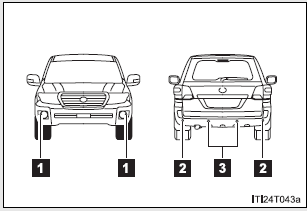
- Front corner sensors
- Rear corner sensors
- Rear center sensors
- Intuitive parking assist switch
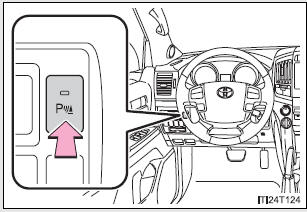
On/off
To turn the system on, press the switch. The indicator light comes on and the buzzer sounds to inform the driver that the system is operational.
To turn the system off, press the switch again.
- Multi-information display
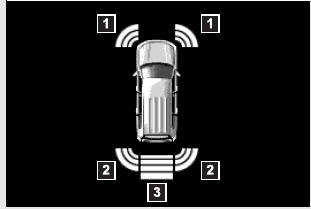
- Front corner sensor detection
- Rear corner sensor detection
- Rear center sensor detection
- Touch screen (vehicles with a navigation system)
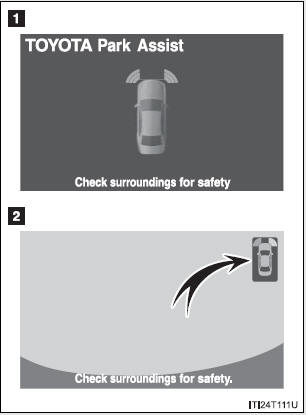
- When the rear view monitor, Toyota parking assist monitor or Multi-terrain Monitor is not displayed
The graphic is automatically displayed when an obstacle is detected. The screen can be set so that the graphic is not displayed.
- When the rear view monitor, Toyota parking assist monitor or Multi-terrain Monitor is displayed (insert display)
A simplified image is displayed on the touch screen when an obstacle is detected.
Sensor detection display, obstacle distance
- Corner sensors
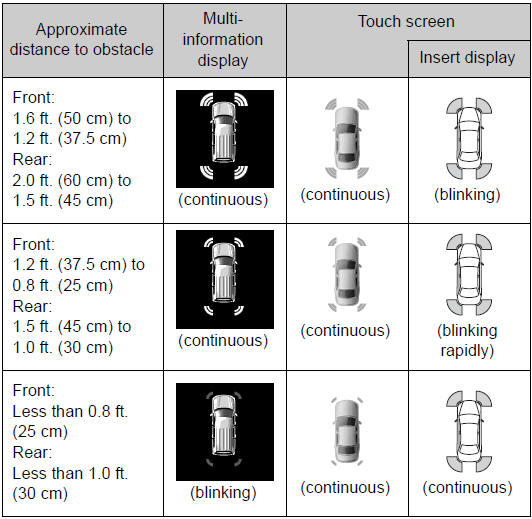
- Rear center sensors
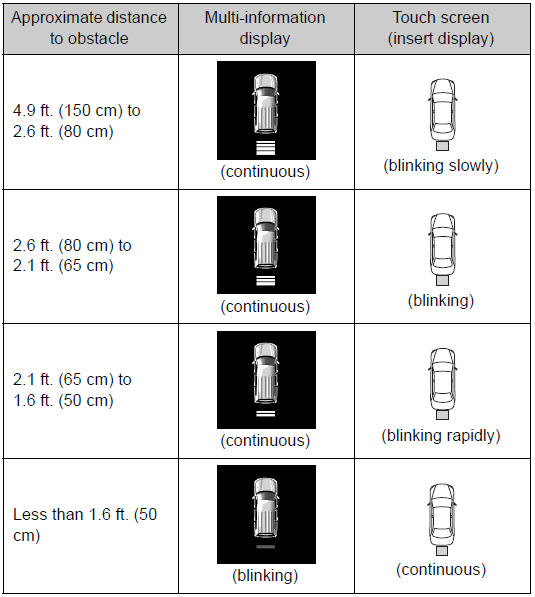
- Buzzer operation and distance to an obstacle
A beep sounds when the corner sensors and rear center sensors are operating.
- The buzzer beeps faster as the vehicle approaches an obstacle.
When the vehicle comes within the following distance of the obstacle, the buzzer sounds continuously:
- Front corner sensors: Approximately 0.8 ft. (25 cm)
- Rear corner sensors: Approximately 1.0 ft. (30 cm)
- Rear center sensors: Approximately 1.6 ft. (50 cm)
- When 2 or more obstacles are detected simultaneously, the beep system responds to the nearest obstacle. If one or both come within the above distances, the beep will repeat a long tone, followed by fast beeps.
- You can change the volume of the warning beeps. (→
Detection range of the sensors
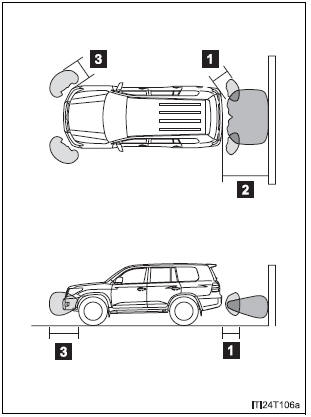
- Approximately 2.0 ft. (60 cm)
- Approximately 4.9 ft. (150 cm)
- Approximately 1.6 ft. (50 cm)
The diagram shows the detection range of the sensors. Note that the sensors cannot detect obstacles that are extremely close to the vehicle.
The range of the sensors may change depending on the shape of the object etc.
Setting up intuitive parking assist (vehicles with a navigation system)
You can change the warning beep volume and touch screen operating conditions.
STEP 1
Press the “SETUP” button.
STEP 2
Touch “Vehicle” on the “Setup” screen.
STEP 3
Touch “Toyota Park Assist” on the “Vehicle Settings” screen.
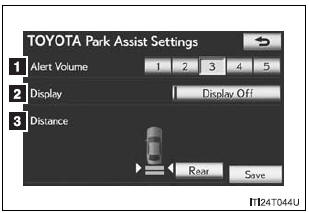
- Alert volume setting
- Display on/off
- Alert distance setting
Make sure to save after changing settings.
- Alert volume setting
The alert volume can be adjusted.
STEP 1
Touch “1” to “5” on the “TOYOTA Park Assist settings”.
STEP 2
Touch “Save”.
- Display on/off setting
On or off can be selected for intuitive parking assist display.
STEP 1
Touch “Display Off”.
When the “Display Off” indicator is turned on, the display of intuitive parking assist will be off. Touch “Display Off” again to turn the display of intuitive parking assist on.
STEP 2
Touch “Save”.
- Alert distance setting
Front or rear center sensors display and tone indication can be set.
STEP 1
Touch “Rear”.
Long distance or short distance can be selected.
STEP 2
Touch “Save”
- The intuitive parking assist can be operated when
- Front corner sensors:
- The “ENGINE START STOP” switch is in IGNITION ON mode.
- The shift lever is in a position other than “P”.
- The vehicle speed is less than approximately 6 mph (10 km/h).
- Rear corner and rear center sensors:
- The “ENGINE START STOP” switch is in IGNITION ON mode.
- The shift lever is in “R”.
- Intuitive parking assist display
When an obstacle is detected while the rear view monitor system, Toyota parking assist monitor or Multi-terrain Monitor is in use, the warning indicator will appear in the top right of the screen even if the display setting has been set to off.
- Sensor detection information
- The sensor’s detection areas are limited to the areas around the vehicle’s front corner and rear bumpers.
- Certain vehicle conditions and the surrounding environment may affect the ability of the sensor to correctly detect obstacles. Particular instances where this may occur are listed below.
- There is dirt, snow or ice on the sensor. (Wiping the sensors will resolve this problem.)
- The sensor is frozen. (Thawing the area will resolve this problem.) In especially cold weather, if a sensor is frozen the screen may show an abnormal display, or obstacles may not be detected.
- The sensor is covered in any way.
- The vehicle is leaning considerably to one side.
- On an extremely bumpy road, on an incline, on gravel, or on grass
- The vicinity of the vehicle is noisy due to vehicle horns, motorcycle engines, air brakes of large vehicles, or other loud noises producing ultrasonic waves.
- There is another vehicle equipped with parking assist sensors in the vicinity.
- The sensor is coated with a sheet of spray or heavy rain.
- The vehicle is equipped with a fender pole or wireless antenna.
- Towing eyelets are installed.
- The bumper or sensor receives a strong impact.
- The vehicle is approaching a tall or curved curb.
- In harsh sunlight or intense cold weather
- The area directly under the bumpers is not detected.
- If obstacles draw too close to the sensor.
- A non-genuine Toyota suspension (lowered suspension etc.) is installed.
- People may not be detected if they are wearing certain types of
clothing.
In addition to the examples above, there are instances in which, because of their shape, signs and other objects may be judged by the sensor to be closer than they are.
- The shape of the obstacle may prevent the sensor from detecting it. Pay particular attention to the following obstacles:
- Wires, fences, ropes, etc.
- Cotton, snow and other materials that absorb sound waves
- Sharply-angled objects
- Low obstacles
- Tall obstacles with upper sections projecting outwards in the direction of your vehicle
- The following situations may occur during use.
- Depending on the shape of the obstacle and other factors, the detection distance may shorten, or detection may be impossible.
- Obstacles may not be detected if they are too close to the sensor
- There will be a short delay between obstacle detection and
display.
Even at slow speeds, there is a possibility that the obstacle will come within the sensor’s detection areas before the display is shown and the warning beep sounds.
- Thin posts or objects lower than the sensor may not be detected for collision when approached, even if they have been detected once.
- It might be difficult to hear beeps due to the volume of audio system or air flow noise of air conditioning system.
- If a message is displayed on the multi-information display
CAUTION
Observe the following precautions. Failing to do so may result in the vehicle being unable to be driven safely and possibly cause an accident.
|
NOTICE
In the following situations, the system may not function correctly due to a sensor malfunction etc. Have the vehicle checked by your Toyota dealer.
If the error occurs even if there is no ice, snow or mud on the sensor, it is likely that the sensor is malfunctioning.
Do not apply intensive bursts of water or steam to the sensor area. Doing so may result in the sensor malfunctioning. |
